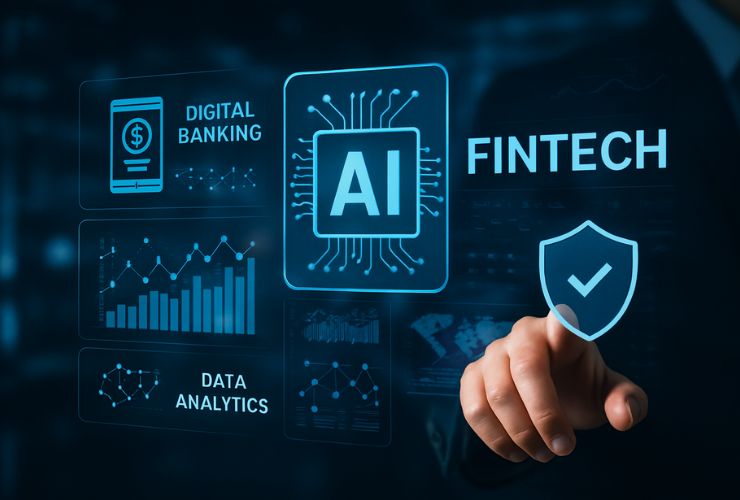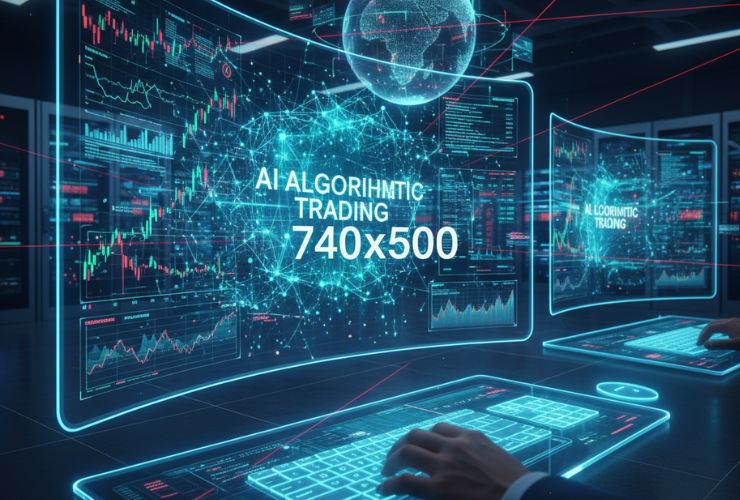Table of Contents
Artificial Intelligence, or AI, is changing how we manage, save, and spend money. It’s the driving force behind a wave of fintech innovations that make banking faster, safer, and easier for everyone. Fintech—which stands for financial technology—uses AI to make finance more efficient and reliable for both individuals and businesses. In 2025, this transformation is stronger than ever, shaping how banks work, how credit is given, and how people handle money daily.
AI in fintech innovations and applications at IBM
What AI in Fintech Means

AI in fintech refers to the use of intelligent computer systems and algorithms that can think, learn, and make decisions like humans—but much faster. These systems are trained to process large amounts of data, recognize patterns, and act on them instantly. For example, AI can flag suspicious activity on your account, suggest better financial products, or automatically help you save based on your habits.
AI allows fintech apps and banks to provide personalized services for every user. From chatbots that answer your questions to tools that predict how you might spend or invest, AI is making financial life simpler and more connected for millions around the world.
How AI Is Used in Fintech

AI isn’t used in just one part of finance—it powers nearly every aspect of it. Here are the main areas where AI is playing a big role in 2025:
1. Smarter Fraud Detection
AI-powered systems watch transactions in real time and flag anything unusual. For example, if your card is used in two countries within hours, AI can pause the transaction and alert you. This real-time protection helps banks and customers avoid billions in fraud losses each year.
2. Improved Customer Service with Chatbots

Instead of waiting on hold for help, customers can chat with AI-powered assistants that are available 24/7. These chatbots answer questions about accounts, reset passwords, or even help with loan applications—quickly and accurately. This not only saves time but also builds better trust between users and financial companies.
3. Better Credit Scoring and Lending
Traditional credit scoring models often ignore people with no previous bank history. AI changes that by analyzing data beyond credit reports—such as spending habits, job stability, and even phone bill payments. This gives more people, especially in developing markets, the chance to get loans and build financial stability.
4. Personalized Investments and Robo-Advisors
Many people now utilize AI-powered apps, known as robo-advisors, for investment advice. These systems study market trends and personal goals to suggest the best investment options. They help users, even beginners, make smarter choices by automatically managing risk and predicting opportunities.
5. Algorithmic Trading

In the world of stock trading, AI systems are taking over. They can scan thousands of data points—from news updates to market prices—in seconds to make fast, data-driven trading decisions. This helps traders and investors reduce risk and improve results with less guesswork.
6. Compliance and Security
Keeping up with laws and data regulations is tough, but AI simplifies it. It monitors transactions and ensures companies follow legal rules, protecting customers and keeping institutions trustworthy. In 2025, AI-driven compliance systems are expected to prevent millions in fines and penalties globally.
Why AI Matters So Much
AI makes finance simpler for customers and more cost-effective for businesses. For banks, automation ensures faster processing of tasks like document review, fraud detection, and loan approval. AI also reduces human errors and improves accuracy across departments.
For everyday users, AI means immediate help, financial transparency, and safer transactions. For example, an AI-based credit assistant can suggest a cheaper loan, help you save for retirement, or warn you about overspending—making financial planning less stressful.
How AI Builds Trust in Fintech
Trust is the foundation of financial services. That’s why all leading fintech companies aim to align with Google’s 2025 E-E-A-T Principles—Experience, Expertise, Authoritativeness, and Trustworthiness. These rules ensure that the information users get from apps or platforms is reliable, expert-backed, and transparent.
AI helps improve trust by providing verifiable insights and factual information. For instance, some apps share how they make loan decisions or which data points influenced a financial recommendation. Transparent, explainable AI creates confidence and helps both customers and regulators understand how systems make decisions.
AI and the Future of Jobs
Some fear that AI will replace human jobs in banking and finance. However, the reality is more balanced. AI is not removing people from the equation—it’s helping them work better. Many roles, like fraud analysts, financial planners, and customer service agents, are shifting toward strategy and supervision rather than routine tasks. AI takes care of the repetitive work, giving humans more time for decision-making that requires empathy and judgment.
The Growing Future of AI in Fintech
Experts expect the AI fintech market to reach nearly $52 billion by 2029, driven by digital banking, smart loans, and real-time payment systems. Here are some of the key trends shaping the future :
- Generative AI in Banking: Tools that help financial professionals write reports, summarize cases, and streamline customer communications.
- Voice and Emotion AI: Banks exploring AI that understands customer tone to improve support and empathy.
- Smarter Budgeting and Saving Apps: Apps that suggest personalized goals and track expenses automatically.
- Decentralized Finance (DeFi) and AI: Using algorithms to manage crypto investments securely and efficiently.
- AI-Powered Financial Wellness Tools: Helping users plan retirement or debt repayment based on real-time spending data.
Challenges to Keep in Mind
AI in fintech also faces challenges. Data privacy is a top concern—people want to know how their data is used and who has access. Biased data can also lead to unfair decisions, like incorrect loan denials. Therefore, responsible AI development, including explainable and ethical AI, is vital for the industry’s long-term success.
Fintech companies are increasingly adopting “Responsible AI” frameworks that ensure fairness, security, and accountability in every system they deploy.
Final Thoughts

AI in fintech is not just about technology—it’s about creating a more connected, fair, and intelligent financial world. It helps customers take control of their finances while enabling companies to innovate faster.
Whether it’s detecting fraud in milliseconds, approving loans in minutes, or offering personalized savings advice, AI makes financial life easier for everyone. In 2025, finance and technology are blending more closely than ever, shaping a system that’s fast, fair, and focused on trust.
This new era of smart finance is here to stay—and it’s powered by artificial intelligence.
Also, check out this “How generative AI transforms content creation“